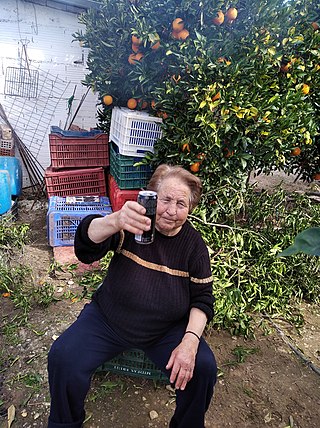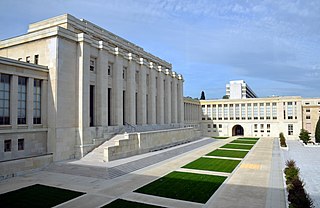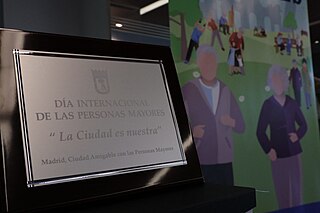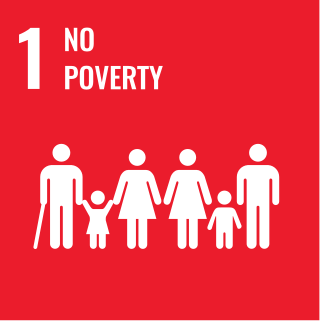Related Research Articles

The United Nations Economic and Social Council is one of the six principal organs of the United Nations, responsible for coordinating the economic and social fields of the organization, specifically in regards to the fifteen specialised agencies, the eight functional commissions, and the five regional commissions under its jurisdiction.

Old age is the range of ages for persons nearing and surpassing life expectancy. People of old age are also referred to as: old people, elderly, elders, seniors, senior citizens, or older adults.

Franz Müntefering is a German politician. He was Chairman of the Social Democratic Party (SPD) from 2004 to 2005 and again from 18 October 2008 to 13 November 2009. He served as the minister of Labour and Social Affairs, as well as the vice-chancellor of Germany, in the cabinet of Chancellor Angela Merkel from 2005 to 2007.
SOS Children's Villages is an independent, non-governmental, nonprofit international development organization headquartered in Innsbruck, Austria. The organization provides humanitarian and developmental assistance to families facing difficulties and supports children and young people without parental care or at risk of losing it. The organization also protects their interests and rights around the world. Today, SOS Children's Villages is active in more than 130 countries and territories worldwide.

Population ageing is an increasing median age in a population because of declining fertility rates and rising life expectancy. Most countries have rising life expectancy and an ageing population, trends that emerged first in developed countries but are now seen in virtually all developing countries. That is the case for every country in the world except the 18 countries designated as "demographic outliers" by the United Nations. The aged population is currently at its highest level in human history. The UN predicts the rate of population ageing in the 21st century will exceed that of the previous century. The number of people aged 60 years and over has tripled since 1950 and reached 600 million in 2000 and surpassed 700 million in 2006. It is projected that the combined senior and geriatric population will reach 2.1 billion by 2050. Countries vary significantly in terms of the degree and pace of ageing, and the UN expects populations that began ageing later will have less time to adapt to its implications.
In its Proclamation on Aging, the United Nations General Assembly decided to declare 1999 as the International Year of Older Persons (IYOP). The proclamation was launched on 1 October 1998, the International Day of Older Persons, by United Nations Secretary General Kofi Annan.
The Otto Hahn Peace Medal in Gold is named after the German nuclear chemist and 1944 Nobel Laureate Otto Hahn, an honorary citizen of Berlin.

An international organization, also known as an intergovernmental organization or an international institution, is an organization that is established by a treaty, or is an instrument governed by international law and possessing its own legal personality, such as the United Nations, the World Health Organization, Save the Children International, and NATO. International organizations are composed of primarily member states, but may also include other entities, such as other international organizations, firms, and nongovernmental organizations. Additionally, entities may hold observer status. An alternative definition is that an international organization is a stable set of norms and rules meant to govern the behavior of states and other actors in the international system.

The International Day of Older People is observed on October 1 each year.
7 Billion Actions is a worldwide campaign established by the United Nations Population Fund (UNFPA) in 2011 to commemorate the world population milestone of 7 billion people. UNFPA is a United Nations organization that works on population and development issues, with an emphasis on reproductive health and gender equality. 7 Billion Actions works with multiple corporations, organizations and individuals to address the 7 Key Issues such as poverty, gender equality, youth, ageing, urbanization, environment, and reproductive health and rights. The UN has declared the World Population surpassing 7 billion on 31 October 2011. Prior to this date, the UN celebrated the Day of Six Billion in October 1999.
The rights of older persons are the entitlements and independence claimed for senior citizens. Elderly rights are one of the fundamental rights of India. The International Day of older persons is celebrated annually on October 1.

The International Federation on Ageing is an international non-governmental organization founded in 1973 and based in Toronto, Ontario, Canada working in the field of ageing, older persons and ageing-related issues such as ageism, The intent of the organisation is for NGOs, the corporate sector, academia, government, and individuals working together to make, according to the IFA’s mission statement, a "change for older people throughout the world by stimulating, collecting, analyzing, and disseminating information on rights, policies and practices that improve the quality of life of people as they age". The IFA has General Consultative Status at the United Nations Economic and Social Council (ECOSOC).

Ursula Lehr née Leipold was a German academic, age researcher and politician. She was the first professor of gerontology in Germany, with a chair at the University of Heidelberg from 1986. She served as federal minister of youth, family, women and health from 1988 to 1991. She was a member of the Bundestag from 1990 to 1994. Returning to science, she founded the German centre for research on aging (DZFA) of the University of Heidelberg in 1995, and was head of the German National Association of Senior Citizens' Organizations (BAGSO) from 2009 to 2015.
Elder rights are the rights of older adults, who in various countries are not recognized as a constitutionally protected class, yet face discrimination across many aspects of society due to their age.

Axel Börsch-Supan is a German researcher, economist and director of the Munich Center for the Economics of Aging (MEA) at the Max Planck Institute for Social Law and Social Policy in Munich, Germany. He is Professor of Economics and Chair for the Economics of Aging at the Technical University of Munich. Additionally, he is Managing Director of SHARE-ERIC. An important field of his empirical research focuses on socio-political issues that are associated with economic aspects of demographic change and the aging of the population.
The proposed Convention on the Rights of Older Persons (UNCROP) is likely to be the next major human rights treaty adopted by the United Nations. The proposed treaty will seek to remedy the fragmented human rights structure for Older Persons, and will focus on reaffirming critical human rights which are of concern to older persons. The focus of the treaty will be persons over 60 years of age, which is a growing demographic worldwide due to increased population ageing. The treaty follows from the success of the United Nations Convention on the Rights of the Child which has seen near universal acceptance since 1989. Where the UNCRC focuses on the rights of younger persons, the UNCROP will address those who form the older portion of society, who according to United Nations reports, are becoming increasingly vulnerable as a group without applicable normative standards of human rights law. Support for a Convention is becoming increasingly popular, as human rights groups including the Committee on Economic, Social and Cultural Rights (CESCR), HelpAge International, the Committee on the Elimination of Discrimination against Women, the International Labour Organization, and many other NGOs and states have expressed support for a universal instrument. A raising number of NGOs from across the world have joined forces in advocating for a Convention in the Global Alliance for the Rights of Older Persons (GAROP) which has been set up out of the need to strengthen the rights of older persons worldwide. With population ageing, the human rights of the growing number of older persons have become an increasingly important issue. Among the human rights issues faced by older persons are ageist attitudes leading to discrimination, exclusion and constraints on the legal capacity, autonomy and independent living of older people. Existing human rights violations have been further exacerbated and put on the spotlight by the COVID-19 pandemic. Older people have been denied access to health services and became prone to physical and social isolation. The stigmatisation of older people and ageist images of older persons have also become more evident. The debate surrounding the convention focuses on the implementation and safeguarding of older persons’ human rights aiming to set normative standards of human rights for older persons in an international legally binding instrument. An underlying common factor and root cause of many of human rights violations experienced by older persons, along with its ubiquitous, prevalent, and surreptitious nature, is ageism. Ageism, as defined by the World Health Organization, refers to the stereotypes, prejudice and discrimination towards others or oneself based on age. A UNCROP would go a long way to tackle ageism. Individual relationships generally fall outside of current human rights law, which seeks to present standards of relations between states and individuals. Therefore, it has been suggested that the proposed human rights convention for older persons ought to be drafted as an anti-discrimination convention. However, this would not be consistent with other multilateral human rights conventions such as the ICCPR and ICESCR which set normative standards.
The international human rights framework and domestic policy are the means by which the human rights of older people in New Zealand are protected. The key human rights issues facing older people in New Zealand encompass full participation within society, access to resources and a positive attitude to ageing.
The International Association of Gerontology and Geriatrics (IAGG), formerly the International Association of Gerontological Societies is a non-governmental organization (NGO) that promotes gerontological research and training, and represents gerontological organizations internationally.

Sustainable Development Goal 1, one of the 17 Sustainable Development Goals established by the United Nations in 2015, calls for the end of poverty in all forms. The official wording is: "No Poverty". Member countries have pledged to "Leave No One Behind": underlying the goal is a "powerful commitment to leave no one behind and to reach those farthest behind first". SDG 1 aims to eradicate every form of extreme poverty including the lack of food, clean drinking water, and sanitation. Achieving this goal includes finding solutions to new threats caused by climate change and conflict. SDG 1 focuses not just on people living in poverty, but also on the services people rely on and social policy that either promotes or prevents poverty.

The German Senior Citizens’ Day is a platform for exchange, information and networking around ageing and later life in Germany. It is used by policymakers, civil society and the society at large to discuss current questions regarding older age. Senior citizens' political participation and their encouragement to discuss key social issues in a self-conscious manner is an important task, which is promoted and demonstrated by events like the Senior citizen's days, as Chancellor Angela Merkel expressed in her speech at the German Senior's Day 2012.
References
- ↑ "BAGSO-Nachrichten". BASGO-Nachrichten 04/2011, S. 5. Retrieved 2021-03-17.
- ↑ "Nationaler Bericht zum Weltaltenplan" (PDF). bmfsfj.de. Retrieved 2021-03-17.
- ↑ "Mitglieder der offenen Arbeitsgruppe zu Fragen des Alterns der UN". social.un.org. Retrieved 2021-03-17.
- ↑ "Mitglieder AGE Platform Europe". age-platform.eu. Retrieved 2021-03-17.